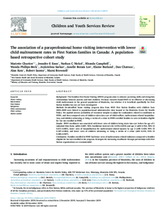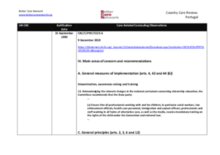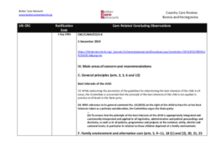Displaying 201 - 210 of 947
Drawing on the findings of a Churchill Fellowship study tour, this article discusses the need to expand understanding of family engagement and, in particular, to implement Family Inclusive practice in Australian child welfare, both to increase reunification and to improve outcomes for children who do not return home.
This article investigates the efficacy of the Families First Home Visiting (FFHV) program, which aims to enhance parenting skills and strengthen relationships between parents and their children.
This country care review includes the care related Concluding Observations adopted by the Committee on the Rights of the Child and the Committee on the Rights of Persons with Disabilities.
The present review addressed the research question What evidence is there that parenting interventions conducted with parents who maltreat their children, reduce the incidence of further child maltreatment?
This country care review includes the care-related Concluding Observations adopted by the Committee on the Rights of Persons with Disabilities and the Committee on the Rights of the Child.
This study aims to assess possible changes in family and parental dynamics among families taking part in a short (6‐session) universal program.
In this article, Patricia O'Rourke describes the way in which she applies psychodrama in her therapeutic reunification work with parents and babies in the child protection system in Australia.
Using a qualitative approach, this study explores children’s contact maintenance with their incarcerated parents during parental incarceration.
In this article, the authors theorize a new conceptual framework of family strengths and resilience emerging at the intersection of indigenous and Western approaches to family systems.
This article theorizes a new conceptual framework of family strengths and resilience emerging at the intersection of indigenous and Western approaches to family systems.



